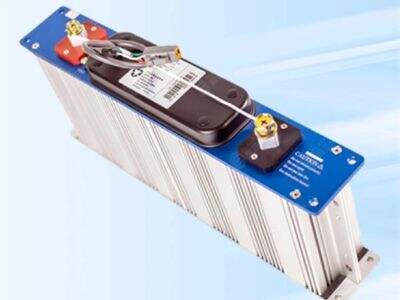The supercapacitor modules significantly depend on the module structural design and choice of the electrode material. How these constituents are configured and selected can affect the supercapacitor’s efficiency, durability, and performance as a whole. Now, let’s discuss the importance of architecture design for supercapacitor modules and how to choose an appropriate electrode material for better performance.
Structure design of supercapacitor modules is critical to:
The modular supercapacitor modules are mainly influenced by structural design. Depending on the layout and interconnection of subcomponents within the module, factors such as power density, energy density, or cycle life can be influenced. Effective energy storage and release, as well as the long-life of the supercapacitor can be realized with a thoughtful structural design. For instance, the placement of electrodes and separators within module may influence internal resistance and capacitance of supercapacitor hybrid, resulting its charging/discharging rate/efficiency.
The supercapacitor module configuration can further affect thermal dissipation and mechanica l reinforce ment. Keeping components where they belong, and using appropriate materials for it's purpose can ensure the heat is managed efficiently, which allows us too avoid them! Further, a strong structure can be designed to such supercapacitor module so as to withstand mechanical stresses and vibrations thereby making it more durable and reliable in practice. In general, the structure of a supercapacitor module is very important for performance as well as long-term utilization.
What is the appropriate electrode material for supercapacitor?
The unswitching of electrodes is another important factor of design for supercapacitors. The selection of materials for the supercapacitor can greatly affect its specific capacitance, energy and power density. Various materials have different conductivity, specific surface area and electrochemical stability, which are the factors that determine their overall performance of supercapacitor. For example, carbonaceous materials such as activated carbon and carbon nanotubes are frequently-used electrode materials for supercapacitor due to their high specific surface area and good electrical conductivity.
In addition, the choice of electrode materials should also take into account cost and availability as well as environmental impact. Although other materials may be more performant, they are also generally costlier and/or less available rendering them unrealistic to utilize for mass production. When considering electrode materials for SCs, it is critical to find the optimal balance between performance and practicability. Finally, we cannot ignore the ecological aspects of materials with regard to sustainable development and environmental standards.
The module structure and electrode material used in supercapacitors are crucial parameters, which could greatly affect the performance and reliability of these energy storage devices. By taking these factors into account and selecting the appropriate materials, manufacturers can tailor supercapacitors for maximum efficiency, longevity, and cost performance in a variety of applications.
What are supercapacitors?
Supercapacitors are gadgets that stockpile and release energy rapidly, and they can be used in a wide range of electronic devices. In designing supercapacitor modules, the module structure and electrode materials for use are of great importance to the performance and efficiency of the device.
What is the best material for supercapacitor electrode?
Type of electrode materials in supercapacitors The electrode materials have a significant influence on the performance of supercapacitors. The carbon-based materials (activated carbon, CNTs and graphene) would be the best candidate electrode materials for supercapacitor. These materials have relatively high specific surface areas, which in turn provide greater charge storage capabilities. Furthermore, metal oxides such as ruthenium oxide and manganese dioxide are frequently employed as electrode materials in virtue of their good conductivity and stability.
Recent developments in the technology of supercapacitor modules
There have been rapid developments in supercapacitor module technology in recent years. Some makers such as iSemi have made great achievements for enhancing the energy density and power performance of SCs with novel structures. With structure design on the module level and high performance of electrode materials, such progress made supercapacitors beyond what they used to be. Moreover, the emergence of smart technologies like IoT connectivity has also made supercapacitors more flexible and applicable across different use cases.
Website to find expert information on supercapacitor module technology & materials
But in order to design (or choose the proper electrode materials of) supercapacitor modules, relying on experts is essential. Firms like iSemi also provide custom services and advice on supercapacitor module design and material options. Their specialists can offer advice and recommendations on the use of the supercapacitor for your application. By working with an established company such as iSemi, the manufacturers are able to have their supercapacitor modules tailored for both performance and dependability.
It is of great importance to the structure design and choices of electrode materials for developing supercapacitor modules with excellent performances. Thanks to the use of best electrode materials and following the technological advances, while taking advice from those who are experts in their field, they can be efficient enough for the requirements of contemporary electronic devices. Enterprises such as iSemi are contributing a lot to the continuation of supercapacitor technology, offering dearly-needed support for its manufacturers.
Table of Contents
- Structure design of supercapacitor modules is critical to:
- What is the appropriate electrode material for supercapacitor?
- What are supercapacitors?
- What is the best material for supercapacitor electrode?
- Recent developments in the technology of supercapacitor modules
- Website to find expert information on supercapacitor module technology & materials

 EN
EN
 AR
AR BG
BG DA
DA NL
NL FI
FI FR
FR DE
DE EL
EL HI
HI IT
IT JA
JA NO
NO PL
PL PT
PT RO
RO RU
RU ES
ES TL
TL ID
ID UK
UK VI
VI TH
TH TR
TR AF
AF MS
MS BE
BE AZ
AZ BN
BN JW
JW KN
KN KM
KM LO
LO LA
LA MY
MY UZ
UZ KY
KY LB
LB XH
XH
